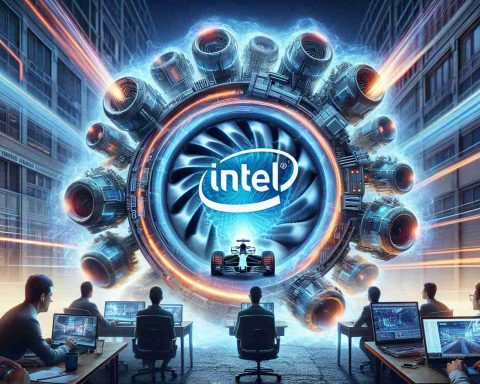The stock market faced significant losses today, with a particular blow to tech stocks as the Nasdaq dropped over 1% early in the day. This downturn follows the announcement of new regulatory measures by President Biden, which have raised alarms in the investment community regarding artificial intelligence (AI) stocks.
The Biden administration introduced stringent guidelines to limit the export of AI chips from leading U.S. companies, including Nvidia, to various foreign entities. The government claims these regulations are essential for enhancing national security and maintaining economic vitality.
In response to the new policies, Ned Finkle, Nvidia’s vice president of government affairs, criticized the administration’s approach as “misguided” and “unprecedented.” He expressed concerns that these measures could hinder America’s role in the global AI landscape and were developed without the necessary legislative oversight.
Consequently, shares of Nvidia saw a decline of approximately 3.7%. Other AI and tech stocks like Super Micro Computer, Micron, and Palantir also experienced sharp falls, with losses ranging from 4.3% to 10%. The broader tech sector was similarly affected, with major players such as Apple, Meta, and CrowdStrike observing declines of over 2%.
Investors are now left grappling with the implications of these regulatory changes and their potential long-term effects on the tech industry.
Market Shifts: The Ripple Effects of AI Regulation
The stock market experienced substantial losses today, particularly impacting tech stocks with the Nasdaq dropping over 1%. This downturn follows President Biden’s announcement of new regulatory measures that have raised concerns within the investment community regarding artificial intelligence (AI) stocks. The administration’s introduction of stringent guidelines to control the export of AI chips from leading U.S. companies—like Nvidia—to various foreign entities is aimed at enhancing national security and maintaining economic vitality.
The repercussions of these regulatory changes extend far beyond immediate stock market fluctuations. While the intention behind the regulations may stem from a focus on national security, the broader implications for the environment, humanity, and future economies warrant significant consideration.
From an environmental perspective, regulations on AI technology can have both positive and negative impacts. On one hand, stringent policies could slow the progress of AI technologies that are crucial for tackling climate change by providing better data analysis, optimizing energy use, and advancing renewable energy solutions. Many AI innovations have the potential to contribute to sustainability initiatives. If the U.S. loses its competitive edge in AI innovation due to restrictive regulations, we may miss out on opportunities to develop environmentally-friendly technologies.
On the other hand, controlling the export of sensitive technologies might prevent the misuse of such advancements in ways that could harm our planet. For instance, if AI is used irresponsibly in industries such as mining or agriculture without proper regulatory checks, it could lead to unsustainable practices that contribute to environmental degradation. In this complex landscape, it becomes clear that the challenge lies in finding a balance between regulation and innovation.
Humanity is also significantly affected by these regulatory dynamics. AI has the potential to revolutionize entire sectors by improving productivity, healthcare, and education. However, regulatory barriers could limit access to the advancements created by U.S. companies. This may hinder global efforts to combat pressing societal issues, such as healthcare inequalities or educational disparities, particularly in developing nations that rely on technology transfers.
Economically, the stock market’s reaction to these regulations illustrates the delicate interplay between government policy and investor sentiment. A decline in stock values, particularly in pioneering companies like Nvidia—a leader in AI technology—can deter investment in the entire tech sector. This situation raises concerns about long-term economic growth. If investor confidence wanes, as has happened after today’s announcements, capital may flow away from innovation into safer, less dynamic investments. Such phenomena could stunt the U.S.’s economic growth at a time when innovation is critical for competitive advantage.
Looking forward, the regulatory environment surrounding AI will be pivotal in shaping the future of humanity. As AI continues to evolve and integrate into every facet of life, governments around the world will face the challenge of crafting legislation that safeguards society while fostering innovation. The future will demand collaborative approaches among nations to ensure that regulations do not hinder progress but instead create frameworks that promote responsible and sustainable development.
In conclusion, while the regulatory measures introduced today seek to enhance national security, they also spark critical considerations about the environment, societal welfare, economic resilience, and global competitiveness. The balance struck by policymakers will determine whether the U.S. maintains its leadership role in the global AI landscape or recedes into a reactive position, shaping the fate of technology and humanity’s trajectory in the years to come.
Market Turmoil: What’s Next for Tech Stocks Amid New AI Regulations?
Understanding Recent Stock Market Declines
The recent significant losses in the stock market, particularly among tech stocks, have put investors on high alert. The Nasdaq’s drop of over 1% is primarily attributed to newly introduced regulatory measures from President Biden’s administration concerning artificial intelligence (AI) technologies. The ramifications of these changes are expected to resonate throughout the tech industry, leading to concerns about future growth and innovation.
Key Features of the New AI Regulations
The Biden administration has rolled out stringent guidelines aimed at controlling the export of AI chips from leading companies in the United States, including giants like Nvidia. These regulations are presented as necessary steps towards enhancing national security and bolstering the U.S. economy. Understanding the specifics of these regulations can help investors make informed decisions:
– Export Limitations: The regulations specifically restrict the export of advanced AI chips to certain foreign entities, reflecting a shift in how the U.S. manages its technological resources.
– National Security Focus: The administration argues that these measures are crucial to prevent sensitive technology from falling into the hands of potential adversaries.
Reactions from Industry Leaders
Ned Finkle, Nvidia’s vice president of government affairs, strongly criticized the new policies, describing them as “misguided” and potentially detrimental to America’s competitive edge in the global AI sector. His perspective highlights a broader concern among tech leaders regarding the lack of legislative oversight in developing these regulations, which could stymie innovation and growth.
Impact on Stock Performance
The immediate effect of these regulatory changes has been a downturn in several companies within the tech sector:
– Nvidia: Shares fell by approximately 3.7%.
– Other AI Stocks: Companies such as Super Micro Computer, Micron, and Palantir encountered losses ranging from 4.3% to 10%.
– Broader Tech Sector: Major players like Apple, Meta, and CrowdStrike observed declines exceeding 2%.
This collective plunge represents a significant reevaluation of tech stocks in light of potential future restrictions on their operations.
Investor Perspectives: Pros and Cons of the New Regulations
As investors analyze the situation, examining the pros and cons of the new regulations becomes essential:
Pros:
– Enhanced national security by preventing sensitive technology from being accessed by adversaries.
– Possible long-term stabilization in the market once clarity on regulations is achieved.
Cons:
– Potentially stifles innovation and competitiveness of U.S. tech firms in the global landscape.
– Immediate negative impact on stock prices, leading to investor uncertainty.
Future Predictions and Market Analysis
Experts predict that if these regulations continue without adjustment, the tech industry may face a prolonged period of volatility. Investors are encouraged to monitor how companies adapt to these new policies, particularly focusing on how they innovate within the constraints imposed by the government.
Conclusion
As the implications of strict AI regulations unfold, investors must remain vigilant, assessing both the immediate impacts and the long-term consequences on the tech market. While the focus on national security may be prioritizing safety, the effects on growth and competitiveness cannot be ignored.
For more insights on market trends and tech innovations, visit Finance.



















